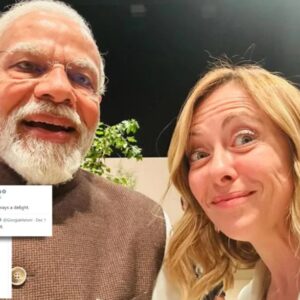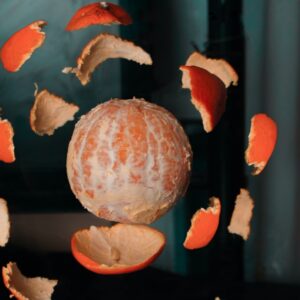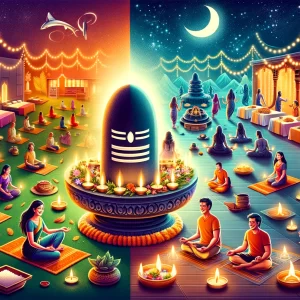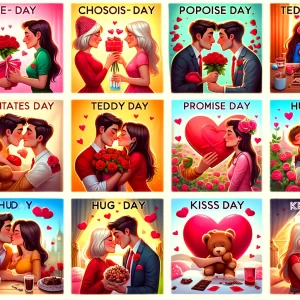Why holi celebrate in India- Holi Festival in india and its significance, where is celebrated, Quotes on color in hindi and English
What is Holi?
Holi color has been celebrate for centuries on the Indian subcontinent, with poems documenting celebrations dating back to the 4th century AD. It marks the beginning of spring after a long winter, a symbol of the triumph of good over evil. It is celebrate in March, corresponding to the month of the Hindu calendar of Phalguna.
There are several accounts of the origin of Holi color mention in various works of ancient Indian literature. According to a popular version of the story, an evil king became so powerful that he force his subjects to worship him as their god. But to the anger of the king, his son Prahlada remain an ardent devotee of the Hindu deity Lord Vishnu. The angry king conspire with his sister, Holika, to kill their son. Holika, who was immune to fire, convince Prahlada to sit on a pyre with her. When the pyre was lit, the boy’s devotion to Lord Vishnu help him escape unscathed while Holika, after which the festival takes its name, was burnto death despite her immunity.

About Holi
Holi color is considere one of the most venerate and celebrate festivals of India and is celebrate in almost all parts of the country. It is also call sometimes like the “Festival of Love”, as in this day, people meet to join, forgetting all resentment and all kinds of bad feelings. The great Indian festival lasts one day and a night, which starts in the night of purnima or the day of the Falgun Moon of Month.
It is celebrate with the name of Holika Dahan Choti Holi color the first night of the festival and is call Holi. In different parts of the country it is known with different names. The vitality of colors is something that brings a lot of positivity in our lives and, being Holi, the color festival is actually a day that is worth rejuvenating. Holi is a famous Hindu festival that is celebrate in every part of India with greater joy and enthusiasm. The ritual begins when the bonfire is lit one day before the day of Holi and this process symbolizes the triumph of the good of the villain. The day of Holi, people play with colors with their friends and families, and at night show love and respect for their hold with Abbey.
The Story of Holi color
According to Hindu mythology, the demon king Hiranyakashipu and his sister Holika receive the blessing that they were immortal and that no one in the universe could kill him.
His son Prahlada was a devotee of Lord Vishnu and, due to his anger, Hiranyakashipu try to kill his son but failed. Eventually, he was save by his sister, Holika. He ask his son Prahlada to sit on Holika lap over the fire.
Miraculously, Vishnu save Prahlada while Holika burn to ashes. Holi is therefore a celebration of the “good” versus the “bad”.
Holi also commemorates the love and romance that exist between Lord Krishna and Radha.
There are a number of tales that recount the various ‘ras-leelas’ that took place in the cities of Mathura and Vrindavan between Krishna and Radha during Holi.
It is believe that on this day Lord Shiva annihilated Kamadeva, the God of love.
Other names of Holi color
- Fagwah (in Assam)
- Festival of colours (in English)
- Vasanta utsav
- Dulhendi
- Sigmo in Goa
- Shimga in Maharashtra
- Doljatra (in Bengali/Oriya)
Significance of Holi color

Despite being such a colorful and joyful festival, there are several aspects of Holi color that make it so important to our lives. While they may not be that obvious, a closer look and a little thought will reveal the meaning of Holi color in more ways than it seems. From sociocultural, to religious to organic, there are many reasons why we should genuinely enjoy the party and appreciate the reasons for its celebrations.
So when Holi color time comes, don’t stop and enjoy the festival to the fullest by enthusiastically participating in every little festival-relate tradition.
Mythological Significance
Holi color approaches our religion and our mythology, as it is essentially the celebration of different legends associate with the party.
The most important thing is the legend of Prahlada and Hiranyakshyap. The legend says that once a demon live and a powerful king, Hiranyakshyap, who is a God consider and want everyone to worship them. For the great anger of him, son of him, Prahlada began to worship, Vishnu. To get rid of Him, Hiranyakshyap ask her sister, Holika insert a burning fire with Prahlada in her lap, as she had made a blessing to go into unharm fire. Legend has it that Prahlada was save from his extreme devotion to the lord, while Holika paid a price for his sinister wish. The tradition of burning Holika or “Holika Dahan” comes mainly from this legend.
Holi also celebrates the legend of Radha and Krishna which describes the extreme joy Krishna felt in applying the color to Radha and other gopis. This Krishna joke later became a fashion and a part of the Holi color festivities.
Info
The mythology also states that Holi color is the celebration of the death of Ogress Pootana, who try to kill little Krishna by feeding him poisonous milk.
Another extremely popular Holi color legend in South India is that of Lord Shiva and Kamadeva. According to legend, people in the south celebrate the sacrifice of the Passion Lord Kamadeva, who risk his life to take Lord Shiva out of meditation and save the world. Furthermore, popular is the legend of Dhundhi’s enlighten who was usually disturbing the children in the reign of Raghu and was finally persecute by the children’s jokes about the day of Holi. Showing the conviction of him in the legend, the children up to date play jokes and launch abuse at the time of Holika Dahan.
Cultural Significance
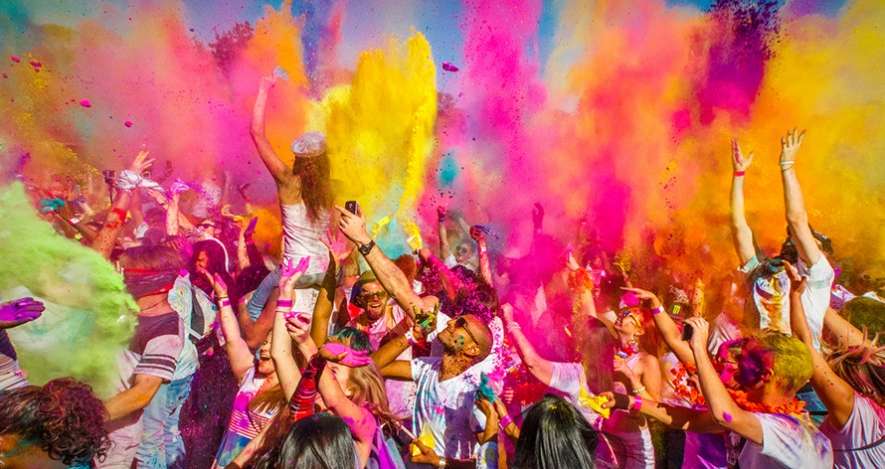
Celebrating the various legends associate with Holi color reassures people about the power of truth, as the moral of all these legends is the ultimate victory of good over evil. The legend of Hiranyakshyap and Prahlad also points to the fact that extreme devotion to God pays off, as God always carries his true devotee into his refuge.
All these legends help people to follow good conduct in their life and to believe in the virtue of being truthful. This is extremely important in modern society when so many people resort to evil practices for small gains and torture those who are honest. Holi color helps people believe in the virtue of being truthful and honest and also fight evil.
Holi color is celebrate at a time of the year when the fields are in full bloom and people are expecting a good harvest. This gives a people a good reason to rejoice, make merry and submerge themselves in the spirit of Holi color.
Social Significance
Holi helps to unite society and strengthen the centuries-old fabric of our country. Because the festival is also celebrate by non-Hindus as everyone likes to be part of such a colorful and joyful festival.
Additionally, the Holi lore is that enemies also become friends on Holi and forget any feelings of difficulty that may be present. Also, on this day people make no distinction between rich and poor and everyone celebrates the holiday together in a spirit of kindness and brotherhood.
In the evening, people visit friends and family and exchange gifts, sweets and greetings. This helps to revitalize relationships and strengthen emotional connections between people.
Biological Significance
As Holi comes at a time of the year when people have a tendency to feel sleepy and lazy. This is natural for the body to experiences some tardiness due to the change from the cold to the heat in the atmosphere. To counteract this tardiness of the body, people sing loudly or even speak loudly. Their movements are brisk and their music is loud. All of this helps to rejuvenate the system of the human body.
Besides, the colours when spray on the body have a great impact on it. Biologists believe the liquid dye or Abeer penetrates the body and enters into the pores. It has the effect of strengthening the ions in the body and adds health and beauty to it.
Also Read: 20+ Epic Fails That Can Make You Feel Embarrassed Watching
Rituals of Holi
Rituals of the ancient festival of Holi are religiously follow every year with care and enthusiasm.
Preparations
Days before the festival. People start collecting wood for the illumination of the bonfire call Holika at the main crossroads of the city. This guarantees that a large stack of wood is collect at the time of actual celebration.
Holika Dahan Celebrations
So on Holi Eve, Dahan takes place. Effigy of Holika, the devil mind sister of demon King Hiranyakshyap is place in the wood and burnt.. Because, Holika try to kill Hiranyakshyap son, Prahlad, a burning devotee of Lord Narayan. The ritual symbolizes the victory of the good of evil and also of the triumph of a true devotee.
Children also pull abuse to Holika and pray jokes, as if they were still trying to scare Dhundhi’s, who once hit the little ones in the kingdom of prithu. Some people also take the embers of fire in their homes to rekindle their national fires.
Play of Colors
The next day is obviously the main day of the Holi celebrations. The day is call Dhuleti and it is on this day that the true play of colors takes place. There is no tradition of holding puja and it is meant for pure enjoyment.
The tradition of playing with colors is particularly rampant in northern India and even in that region there is no comparison with Holi in Mathura and Vrindavan. Even in Maharashtra and Gujarat, Holi is celebrate with great enthusiasm and fun.
People take extreme delight in spraying colour water on each other with pichkaris or pouring buckets and buckets of it. Singing Bollywood Holi numbers and dancing on the beat of dholak is also a part of the tradition. Amidst all this activity people relish gujiya, mathri, malpuas and other traditional Holi delicacies with great joy.
Drinks, specially thandai lac with bhang is also an intrinsic part of the Holi festivity. Bhang helps to further enhance the spirit of the occasion but if taken in excess it might dampen it also. So caution should be taken while consuming it.
Holi Celebrations in South India
In the south of India, however, people follow the tradition of the adoration of Kamadeva, the love of love of Indian mythology. why celebrate holi People have faith in the legend who speak of the great sacrifice of Kamadeva when he shot his love arrow in Lord Shiva to break his meditation and evoke him interest of him for worldly affairs.
Subsequently, a one-day people and fans become a bit sober at night and greets friends and the family that visit them and exchanges candies. Various cultural organizations are also organize by various cultural organizations to generate harmony and brotherhood in society.
Holi in India
Holi is one of the major festival of India and is the most vibrant of all. why celebrate holi The joys of Holi knows no bound. The festival is celebrated across the four corners of India or rather across the globe. The festival is fill with so much fun and frolic that the very mention of the word ‘Holi’ draws smile and enthusiasm amongst the people. Holi also celebrates the arrival of Spring, a season of joy and hope.
Legend of Holi Festival
Holi is one of the oldest festivals in India. There are many interesting stories associate with the origin of the festival as you travel through the different states from north to south and east to west. Paintings and writings represent the roots of the festival. Mythology plays a very important role in the narrative of the Holi festival. The most popular stories about the origins of Holi refer to “Holika Dahan” and Legend of Radha-Krishan.
Story of Holika
Entirely intertwined with Holi is the tradition of “Holika Dahan” which is actually lighting bonfires. The ritual is a symbol of the victory of good over evil and is rooted in the legend of the demon king Hiranyakshyap wishing to end the life of his blessed son, Prahlad, with the help of his sister, Holika, who was burned to death. fir and Prahlad did not suffer any damage. Since then, the day has been celebrated in the victory of good over evil.
Story of Radha and Krishan
The legend of Radha and Krishna is intimately link to this tradition of colors in Holi. The dark-skinned young Krishna was jealous of the very white skin of his belove Radha. why celebrate holi In a mischievous mood, he applied color to Radha’s face. Following this ancient legend, lovers to this day ardently desire to color their belove as an expression of love.
Holi Celebrations in India
Holi is famous as Basant Utsav in rural India. It is one of the most important holidays in India and is celebrate with great enthusiasm and joy. Gulal, Abeer and pichkaris are synonymous with the festival. Elaborate plans are made for coloring love ones. Each wants to be the first to color the other. In the ensuing battle of colors, everyone drowns not only in the colors of the gulal but also in love and joy. People love to bathe themselves and others in color water. Gujiya and other sweets are offer to all who come across to color.
The temples are beautifully decorate in the time of Holi. The idol Radha is place on the swings and the devotees spin the swings singing Holi devotional songs. Small shows are currently organize that reflect the spirit of the festival.
What is strikingly the same across the country is the spirit of Holi. Fun, revelry, hustle and bustle for foolishness mark this festival of colors. What more can you expect? When people get a social sanction for getting drunk on bhang, they open up not only the heart but also the lungs. And purple too, no one should be offended, as the norm of the day is “Bura na mano Holi hai”.
Holi in Mathura-Vrindavan
People from all corners of India, rather from the world, gather in Mathura-Vrindavan every year to feel the essence of Holi in the land of Krishna. People revive the Holi legends associated with Radha and Krishna and play pranks that young Krishna played on cowgirls called gopis. The underlying feeling of this fun was love and devotion. Even today, romance can be experienced in the very atmosphere of Krishna-nagari. Just breathe this air and immerse yourself in the feeling of love and romance. Myriad colors of Holi are simply a façade on this.
Celebrations Continue for a Week
With an immensely strong bonding with Lord Krishna, people of Mathura and Vrindavan celebrate Holi for over a week. Each major Krishna temple celebrates Holi on a different day. Of immense interest for the tourist is the celebrations which take place at the famous Bakai-Bihari Temple at Vrindavan. Drenched in the colours of Holi people can be found totally immersed in the spirit of devotion here.
The Legend
The tradition of playing colours on Holi draws its roots from a legend of Radha and Krishna. why celebrate holi It is said that young Krishna was jealous of Radha’s fair complexion since he himself was very dark. He narrated his woe to mother Yashoda, who teasingly asked him to colour Radha’s face in which ever colour he wanted. In a mischievous mood, Krishna applied colour on Radha’s face. The tradition of applying colour on one’s beloved is being religiously followed till date.
Holi in Barsana
Holi of Barsana, the birthplace of Radha, a village 42 kms away from Mathura is of particular interest. Here, men from Nandgaon, the land of Krishna come to play Holi with the girls of Barsana and hope of raising their flag over Shri Radhikaji’s temple. But, instead of colours they are greeted with sticks by the gopis. Hence, the Holi get its new name here-Lath maar Holi.
why celebrate holi Smart enough, men come fully padded as they are fully aware what kind of welcome awaits them and also the fact that they are not allowed to retaliate on that day.
Also Read : Funny Shayari About Love that You can share with your Loved ones
Holi in Delhi
The moment you think about Holi, you start smiling, right? Of course! It is the festival of colors, joy, unification, dance and foods like Gujiya, Masala Mathri, Samosa, Puran Poli, Thandai, Chaats like Papri Chaat and Dahi Balla. The list is endless!
But how do people in Delhi celebrate Holi? How is Holi in Delhi different from Holi in Mumbai or Goa or Udaipur or Kolkata or overseas?
Let’s learn about the special Holi in Delhi. Holi celebrations in Delhi often begin with a “Tilak”. A Tilak is a traditional color mark drawn on a person’s forehead. For some it is a symbol of honor, for others it represents trust. Some wear it out of habit. Some believe it is a good omen. People also greet each other with wreaths before starting Holi. The people of Delhi (people living in Delhi) celebrate the sacred with endless music. Delhi is believe to have a musical Holi.
Holiyappa, 2022!
The event took place on the 18th of March, 2022. It was organize in The Junction, Green Park Delhi. The event promote to offer lovely music to the audience so that they could dance and enjoy. It present some famous DJs like Dj Dheer and Dj Tanuj. Its theme was ‘Music, colours and good vibes’.
Holi Sangria, 2022!
Another upcoming event of 2022, Holi Sangria is extravagant celebrations. According to sources, it will be hosted in The Game Forest club, Archview Drive, Sector- 58, Gurugram. You can expect amazing fun here. There will be vibrant colours along with the music.
Sumptuous Holi Foods From The City Of Delhi!
Let’s read about some of the most popular Holi foods in Delhi
Thandai-
You can assume from the name if you have never test it, that it is a cold drink. But wait! It isn’t a regular soft drink like Pepsi or Coca-Cola. A Thandai is a special drink prepare with pure water, sugar, almonds, saffron poppy seeds and more. It has malai or milk fat in it. It tastes heavenly and sweet drink that is cold. People who drink glasses if thadai enter a state of euphoria or exhilaration. They are often seen, emitting intoxicating behaviours.
Gujiya
A Gujiya is a sweet dumpling. It has a filling of khoya and dry fruits. It is deep fried. A Gujiya is a must edible when you think of Holi in Delhi. In Delhi, it is a common sight where happy faces smeared with vibrant colours gorge on gujiya during Holi.
Laddoo!
It is because Delhi is a concoction of different cultures and customs, it has a host of foods belonging to different parts of India. Laddoo is a famous sweet during Holi in Delhi. Holi and Delhi are inseparable. Endless people in Delhi get engross in the Holi celebrations, forgetting all the sorrows of life.
Holi in Rajasthan
The colorful state of Rajasthan interprets holi india festivalin the same way as Mathura. One night before the full moon, crowds of people gather and light huge bonfires to burn the remaining dry leaves and twigs of winter. People throw color water and powders (gulal and kumkum) at each other and have fun. The singing, dancing and traditional rhythms of dhol add to the joy of the occasion.
Celebrations by Royals
On this day, even the royals of Rajasthan don a festive spirit and mix with the plebeians. Approach, real fields throughout North India have refine the festival in an art. Rajasthani Rajasthani courts warriors were use to show their equestrian skills during the festival.
Even today, Rajput men should be steed through white and pink clouds, launching color powders to each other. Even members of real families are not immune to be immerse by color.
Braj Mahotsav
The Braj Festival is held in honour of Lord Krishna a few days before holi india festival, in the month of March. The festival is mark by verve and zest. Villagers, in gay, multi hue attire, can be seen singing and performing the raslila depicting the immortal love-story of Radha and Krishna.
Folk Traditions in Rajasthan
Mali Holi-The colourful festival of holi india festival is play in many different ways. The ‘mali’ or gardener community of Rajasthan has a unique style where the men colour the women with water and women retaliate by hitting them with sticks or long pieces of cloth
Gair at Godaji- Men from 12 villages collect at Godaji village near Ajmer in Rajasthan to play gair a few days after holi. Each village brings his own drummer and gair troupes. The picturesque location for it is a valley surround by hills on all sides. Thousands of onlookers and close to hundred players make a wonderful sight and a fond memory.
Dolchi Holi at Bikaner-In Bikaner district, members of ‘Harsh’ and ‘Vyas’ communities have been celebrating holi india festival by throwing water at one another with force for the past more than 300 years. A specially design vessel call ‘Dolchi’ made from camel skin is use for the purpose. But the water is thrown only at the back of an individual.
Holi in Uttar Pradesh
The celebrations in UP are not limit to just Mathura and Vrindavan. Rather, every corner of the state is envelope in the multiple shades of holi india festival. why celebrate holi In this rather conservative state, holi india festival gives young people a license to socialize freely and give colorful expression to their feelings for each other. Don’t miss the delicious treats the state has for the festival. Gujiya, mathri, Dahi badas are a must as well as many other festive delicacies.
Holika Dahan
The major ritual of holi india festival in this state is the lighting of bonfires. Better known as Holika on Choti Holi on a day prior to the main Holi. The tradition signifies the victory of good over evil and finds its root in the various legends associated with the festival.
Bhang
An explanation of Holi is incomplete without mentioning Bhang. For many, this has become the difference with holi india festival. The tradition of eating bhang, an intoxicating drug, is practiced in northern India. It is usually eaten in the form of Laddoo or thandai. Eating bhang is an addition to the feast when people get up about it.
land of Shiva, Benares, particularly famous for its high gastronomic level. Sitting on the “gat” or the stairs leading to the Ganges river, you can see people of different colors hitting a fringe and mixing them with milk and various dried fruits to add flavor.
Celebration of Barley Harvest
The celebration is also a celebration of the barley harvest. In Choti holi india festival, people meet to establish fires. They buried a new pot of barley seeds in play to roast it. These seeds ate after the fire. The divination of the next harvest begins to establish the direction of the flame or state of the seeds in a funeral vessel. Sometimes people bring embers to their homes to set them on fire. The ashes of the holi india festival fires are also believed to protect against infection.
Holi Celebrations at The Dwarkadhish Temple at Mathura
The celebration of holi india festival is closely link to the legends of Radha and Krishna in Indian mythology. Krishna, with his dark face, envied the beautiful Radha. He believes he once painted Radha’s face out of envy to make her look like him. These old legends still have people who like to paint their faces with colors and celebrate the love they have in their lives.
Holi Celebrations At Dwarkadhish Temple
why celebrate holi Mathura Building Temple Dwarkadhish is call “color riot” correctly for holi india festival. Congratulations every day at the Krishna Temple, which continues for a week. The traditions of Lathmar Holi are rent in this temple. Holi’s Day of Mathura is the day I watch the temple of Dwarkadhish.
why celebrate holi Everyone attended the temple to participate in every life of all people living with the temple. They come together and color each other. The temple priest poured colored water over the disciples to symbolize joy in the lives of all who were there.

